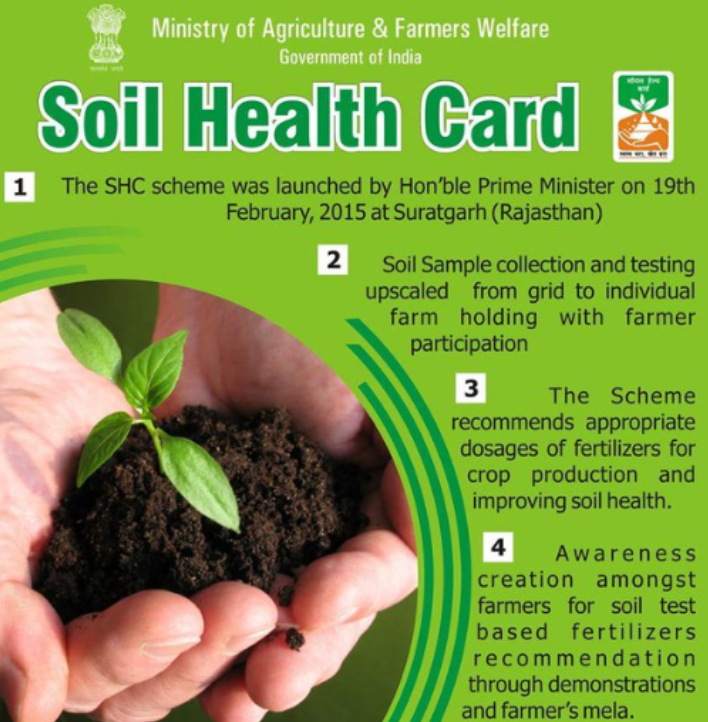Growing Your Wealth: A Guide to India’s Soil Health Card Program The Soil Health Card Program is a ground-breaking initiative that is reshaping the agricultural landscape. It was introduced by the Indian government in 2015. It paves the way for increased productivity, sustainable practices, and ultimately a brighter future for Indian agriculture by providing farmers with essential information about the health of their soil.

Img Src:- SoilHealth.dac.gov.in
How does the Soil Health Card Program work?
Envision a customized report card for your dirt, specifying its supplement levels, pH equilibrium, and natural matter substance. The Soil Health Card Scheme provides exactly that. Farmers receive a soil health card for each of their holdings through this program. This card gives important information about:

Img Src:-SoilHealth.dac.gov.in
Macronutrients: Potassium, phosphorus, and nitrogen (NPK) levels, which are necessary for plant growth and yield.
Micro- and Secondary Nutrients: Sulfur, zinc, iron, copper, manganese, and boron are essential for the health of the soil and certain crop requirements.
Physical Dimensions: The availability of nutrients and the structure of the soil are affected by the pH level (acidity/alkalinity), electrical conductivity (salinity), and organic carbon content.
Getting the Most Out of It:

Img Src:- SoilHealth.dac.gov.in
Farmers who are equipped with this information stand to benefit greatly:
Fertilization with Information:
Utilize fertilizers sparingly and in accordance with actual requirements to cut costs and impact on the environment.
Enhanced Crop Quality and Yield:
Improve the balance of nutrients for healthier and more productive crops.
Sustainable Use of the Land:
Implementing practices like crop rotation and organic amendments can help maintain the health of the soil over time.
Lower Requirement for Chemical Fertilizers:
Change your approach to one that is more ecologically friendly and balanced.
Enhanced livelihoods and incomes for farmers: Farmers’ profits rise as a result of increased productivity and lower costs.
How the Plan Works:
In India, a network of soil testing laboratories oversees the Soil Health Card Scheme. Ranchers can get their dirt tried at these labs, typically at financed rates or in any event, free of charge. After that, the test results are looked at and turned into the easy-to-understand soil health card, which includes recommendations for fertilizers for specific crops.
Having an Impact:
Indian agriculture has already been significantly impacted by the Soil Health Card Scheme. Its insights have helped millions of farmers, resulting in:
Gains in Crop Yields:
Various crops’ yields increase by 5-10% on average, according to studies.
Reduced Use of Fertilizer:
The amount of fertilizer used has decreased by 10-15%.
Enhanced Health of the Soil: Soil organic carbon content and nutrient balance show positive trends over time, according to long-term monitoring.
Looking Forward:
The recent integration into the Rashtriya Krishi Vikas Yojana (RKVY) has expanded the Soil Health Card Scheme’s reach and effectiveness. The process is further being streamlined and farmers are being empowered with real-time information thanks to technological advancements like mobile apps and online platforms.

Img Src:-pibindia/X
Getting Involved:
The Soil Health Card Scheme is a useful tool for cultivating a prosperous and long-lasting future for your land, regardless of whether you are an experienced farmer or just starting out. Get your soil tested at the closest lab for soil testing, and you’ll learn the secrets to healthy, productive soil. Keep in mind, sound soil is the underpinning of a prosperous homestead and a flourishing horticultural biological system.
So, start today and join the effort to make Indian agriculture’s future healthier and more long-lasting!
Additional Information:
The official Soil Health Card Scheme website is: New Soil Health Card Program Press Release: https://soilhealth.dac.gov.in/
Krishi Bhavan’s website can be found at https://pib.gov.in/PressReleaseIframePage.aspx?PRID=1947891.
Indian farmers can begin a new chapter of success for both themselves and their land by comprehending and utilizing the Soil Health Card Scheme, which can be found at http://www.agricoop.nic.in/. Let’s make a future where farmers’ dreams and aspirations are supported by healthy soil in addition to their crops.
Click Here For More Latest Schemes
Soil Health Card Scheme FAQs: Your Questions Answered!
General:
- What is the Soil Health Card Scheme?
- The Soil Health Card Scheme is a government initiative that provides farmers with personalized reports on their soil’s nutrient levels and health. This information helps them make informed decisions about fertilizer use, crop selection, and other agricultural practices.
- Who is eligible for the Soil Health Card Scheme?
- All farmers in India are eligible for the Soil Health Card Scheme, regardless of the size or type of their farm.
- How much does it cost to get a Soil Health Card?
- Soil testing for the Soil Health Card Scheme is usually subsidized or even free for farmers.
- Where can I get my soil tested?
- You can get your soil tested at government soil testing laboratories or mobile soil testing units across India.
Benefits:
- What are the benefits of using the Soil Health Card Scheme?
- The Soil Health Card Scheme can help farmers:
- Increase crop yields
- Reduce fertilizer use and save money
- Improve soil health and sustainability
- Choose the right crops for their soil
- Reduce environmental impact
- The Soil Health Card Scheme can help farmers:
- How much can I increase my crop yield by using the Soil Health Card Scheme?
- Studies have shown that farmers can increase their crop yields by 5-10% on average by using the Soil Health Card Scheme.
Implementation:
- How often should I get my soil tested?
- It is recommended to get your soil tested at least once every 2-3 years.
- What kind of information is included on the Soil Health Card?
- The Soil Health Card includes information on:
- Macronutrient levels (Nitrogen, Phosphorus, Potassium)
- Secondary and micronutrient levels (Sulfur, Zinc, Iron, etc.)
- Physical parameters (pH, electrical conductivity, organic carbon content)
- Crop-specific fertilizer recommendations
- The Soil Health Card includes information on:
- What if I can’t read the information on the Soil Health Card?
- You can get help from agricultural extension officers or other technical personnel to understand the information on your Soil Health Card.
Additional Resources:
- Where can I find more information about the Soil Health Card Scheme?
- You can find more information on the official website of the Soil Health Card Scheme: https://soilhealth.dac.gov.in/: https://soilhealth.dac.gov.in/
- You can also contact your local agricultural extension office.










